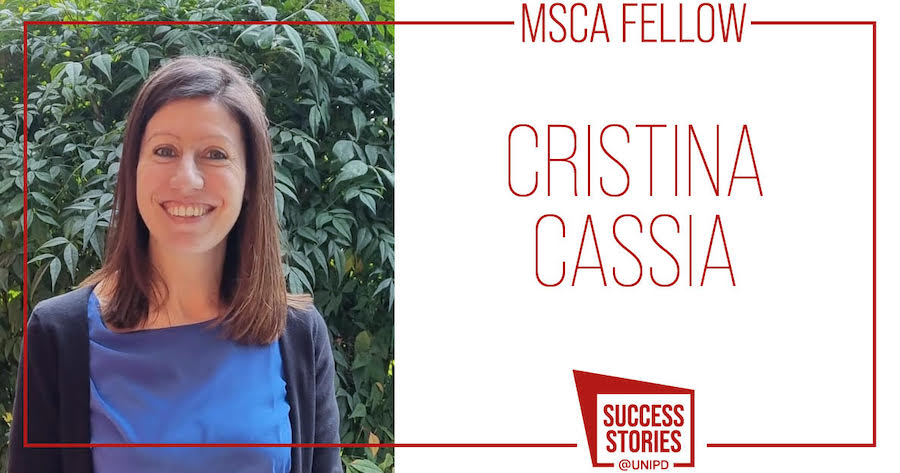
MSCA Fellow: Cristina Cassia
Do you know Pietro Bembo? He was not only a well-known humanist, but also interested in music. Cristina Cassia is studying this great figure of the XVI century, discovering his contribution to the musical environment and to composers of the Renaissance.

Cristina Cassia graduated in Classical Literature and in Musicology from the universities of Milan and Cremona; she also holds degrees in Piano and Organ from the conservatories of Mantua and Venice. After joining the musicological team 'Ricercar', at the Centre d'Études Supérieures de la Renaissance (CESR) in Tours (2010-2013), she earned a Ph.D. in Musicology co-sponsored by the CESR and the Université Libre de Bruxelles (ULB - FNRS). Since 2017 she has been associated researcher of the CESR of Tours, and from 2018 to January 2021 she was part of the research team 'Polifonia Sforzesca' at the Schola Cantorum Basiliensis in Basel.
Her project as MSCA fellow at the Department of Cultural Heritage of the University of Padua, under the supervision of Prof. Marina Toffetti, focuses on the multiple links between the Venetian humanist Pietro Bembo (1470-1547) and the music of his time, and tries to reconstruct the soundscape that surrounded him, and his musical interests and networks.
Can you briefly and simply explain what your MSCA research project is about?
My project aims to restore the missing musical dimension in the scholarly portrait of the well-known humanist Pietro Bembo (1470 - 1547). His works are widely known and his rich epistolary attests both his contacts with all the most important figures of his time, and the variety of his interests, ranging from literature to art. All these topics have already been studied in detail; only Bembo’s links with music have not received much attention so far. My research focuses therefore on reconstructing Bembo’s soundscape and his involvement in the musical milieu, and on measuring the impact that his texts had on some of the most distinguished Renaissance composers, who continued to set them to music even decades after Bembo’s death.
You have studied and worked in different Universities and your interest in music allows you to be part of a network comprising Italian and European cities. What did you learn in such different environments? Would you consider your varied experiences as an added value helping you win the MSCA fellowship?
I learned a lot in each city where I studied and worked, but the years spent abroad in Tours, Bruxelles, and Basel were surely the most challenging and enriching, from both a working and a personal point of view. I had the chance to work on very interesting projects concerning different aspects of Renaissance music, and to be part of wonderful teams, with colleagues and friends coming from various countries and having different experiences and approaches to the same topics. Certainly this has opened my mind and I am persuaded that this was the strongest point of my CV when I applied for the MSCA fellowship.
The MSCA IF projects are intended as training-through-research projects: Can you tell us something about the training you are currently undertaking? What is the role of your supervisor and how do you work together?
Interdisciplinary aspects are crucial to my project, therefore I am trying to develop my skills in networking and communication, taking part in international conferences also attended by scholars of other disciplines and learning as much as possible from different research perspectives. In this I am also encouraged by my supervisor, Marina Toffetti: we talk very often and exchange ideas about the development of the project, and she often involves me in activities which can be related to my research. MSCA IF projects are meant to reinforce the independence of the researcher and the role of my supervisor is very important, because Marina Toffetti, thanks to her experience and helpfulness, stimulates me to consider things from different points of view and to reinforce my skills.
Why did you choose the University of Padua as your host institution?
Behind my choice, there are a few different reasons: the international renown of the University of Padua, the desire to work under the supervision of Marina Toffetti (whom I have known for about ten years), and the links between Padua and Pietro Bembo. Bembo in fact spent a few years in Padua, before being appointed cardinal and moving to Rome (leaving his children in Padua) and he even studied philosophy at this university in his youth.
What are the best and most difficult aspects of a MSCA application?
The best aspect of the application is the fact that the template is structured in a clear way and it forces you to focus on every aspect of your project. Personally, I found it difficult to imagine the impact and to give details concerning the dissemination and exploitation of the results. In any case, the International Research Office of the University of Padua is very helpful in case of questions or doubts during the whole process of application, and, if you want, even gives you feedback on your project before you submit it.
What would you suggest to a researcher who is thinking about applying for a MSCA Postdoctoral Fellowship?
The MSCA Postdoctoral Fellowship is a unique opportunity that allows you to work on a project that you yourself have conceived and to broaden the field of your knowledge and skills, working in a new and stimulating environment. I would suggest taking time to plan the proposal carefully, exchange ideas with the future supervisor, and contact the International Research Office. Surely it is hard to obtain the fellowship, but if you have a project in which you believe, it is definitely worth trying.
Project: BEMUS - Pietro Bembo's soundscape: a musical tour in the early modern Italian peninsula
International Research Office
via Martiri della libertà 8, 35137 Padova, Italy
tel. +39 049.827 1947 / 1948 / 1945
fax +39 049.827 1911
international.research@unipd.it


